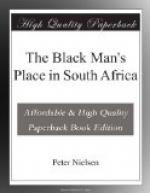While I do not pretend to philological authority I do claim the ability to make a sound comparison between the main Bantu languages which I know and those European languages with which I happen to be familiar, and I have no hesitation in saying that though the Bantu types are not at present as fully developed in point of simplicity and preciseness as are the main languages of Europe they are, nevertheless, by reason of their peculiar genius, capable of being rapidly developed into as perfect a means for the expression of human thought as any of the European types of speech; they are astonishingly rich in verbs which make it easy to express motion and action clearly and vividly; the impersonal, or abstract article “it” is used exactly as in European languages, and the particular prefix provided in some of the Bantu types for the class of nouns which represent abstract conceptions makes it possible to increase the vocabularies in that direction ad infinitum. The Bantu types are not so-called holophrastic forms of primitive speech in which the compounding of expressions is said to take the place of the conveyance of ideas, nor are they made up of onomatopoetic, or interjectional expressions, if indeed such languages exist anywhere outside the heads of the half-informed. They are languages equal in potential capacity to any included in the main Indo-European group. Even now in their comparatively undeveloped state these languages are capable of expressing the subtleties of early philosophical speculation. I would not, for instance, feel daunted if I were set the task of translating into any of these main types, say, the dialectics of Socrates. To do this I would first reduce the more complex terms to such simple and common Anglo-Saxon words as when built together would give the same meaning, and then translate these into their Bantu equivalents. The substitution of Anglo-Saxon words for those of modern English would, no doubt, involve a good deal of repetition but the sense would be adequately rendered. I would proceed in the same way as the early teachers and writers who had to build up the language they used as they went along. The English indeed, have not built up their world-wide speech with their own materials but have, with characteristic acquisitiveness taken the combinations they wanted, ready made, mainly from Greek, Latin and French. How far and how well a Native would understand my presentation of metaphysical speculation would depend upon the degree of familiarity he might have acquired, through Missionary teaching or otherwise, with abstract notions in general. In my opinion the average “raw” Native would understand as well and as much as the average uneducated European peasant. Both would probably find my disquisition “sad stuff”; both would require time for that repetition of the words which is necessary to familiarise the mind with the unaccustomed ideas they represent; in both cases one would have to “give them the words that the




